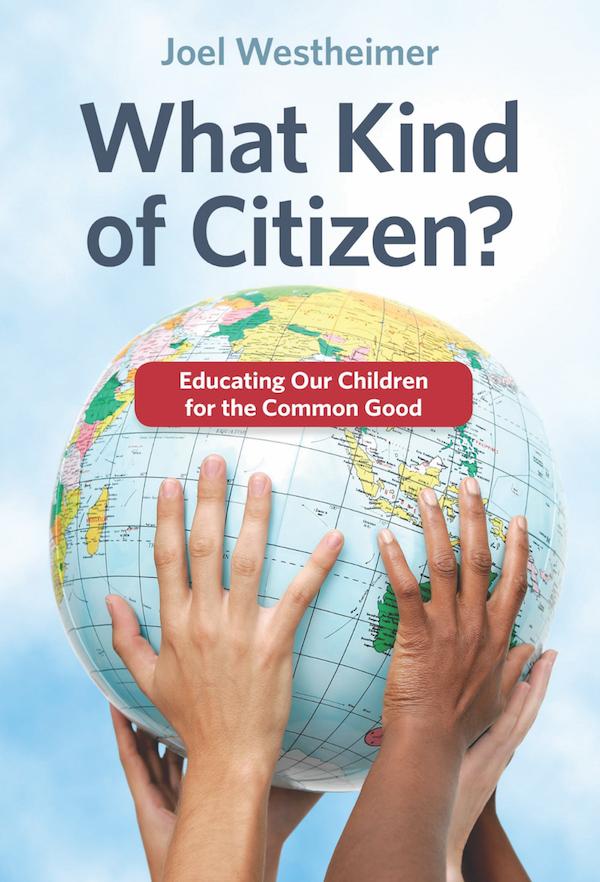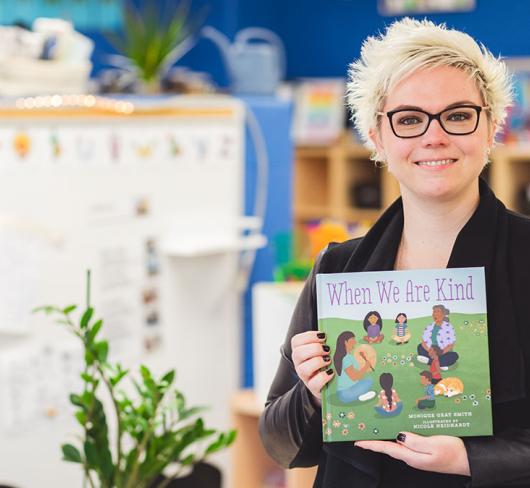
What Kind of Citizen? Educating Our Children for the Common Good
Like its title, Joel Westheimer’s recent book asks what kind of citizens our education programs imagine. Do “schools in democratic societies teach children to think they are individual actors who work with others to create a better society? Are they taught to think for themselves and to govern collectively?”
Westheimer’s view is that the goals of education have shifted away from preparing students to be active and engaged citizens. Through standardized curriculum and standardized testing, schools have moved to a more narrow focus on career preparation and individual economic gain. Both factors work against fostering the critical thinking skills that politicians and education policymakers say should be at the heart of 21st century education.
What Kind of Citizen stands as a treatise on public education’s role in educating students to be active, responsible citizens in a democratic society. It makes the case that educators have an important opportunity to influence how students understand the world and how they view their capacity to shape it.
A professor in the University of Ottawa’s faculty of education, Westheimer has a particular interest in the relationship between education and democracy. He is also a vocal critic of standardized testing.
Westheimer began his education career as an elementary teacher in New York City’s public schools. He later went on to graduate school where his research included studying the different approaches schools adopt for teaching students about being citizens. Much of his book is based on the American schools, particularly the high schools, he and his research partner Joe Kahne studied. Nevertheless, it is useful for reflecting on how the Ontario curriculum, the provincial testing program and educators’ own views on what constitutes a citizen affect how we educate students for their future civic responsibilities.
How Well do Public Schools Succeed in Educating Responsible Citizens?
Education means more than teaching students the basics in literacy and numeracy. Westheimer argues that students are being asked to read but not to consider what’s worth reading. They are being asked to be proficient in adding numbers but not at thinking about what the answers add up to or how they connect to our society. He laments that curricular approaches that “spoon-feed” students to be successful on narrow academic tests “teach students that broader critical thinking is optional.”
Ontario does not experience the egregious consequences of the high-stakes testing culture that characterizes education in the United States. But we share some of the outcomes, including an over-emphasis on literacy and numeracy to the detriment of other subjects such as social studies, history, science and the arts. Westheimer observes that proponents of teaching these latter subjects feel compelled to demonstrate how they contribute to improved literacy and numeracy achievement. This is certainly happening in Ontario and other provinces where there is pressure to link, for example, the importance of studying music to strengthening numeracy skills. Forsaken all too often is the understanding that studying the arts can contribute to students’ sense of self, understanding of humanity and general well-being.
Teacher professional judgment is another casualty of standardized curriculum and assessment, according to Westheimer. He contends that a once passionate, personal and professional approach to curriculum development and instruction has become characterized by an “assembly-line malaise” in a growing number of schools. He argues that the only way schools can create learning environments that support teaching students how to think and critically analyze multiple perspectives is to free teachers to explore their own interests and passions.
What Kind of Citizens Are Schools Teaching Students to Be?
Much of this book focuses on a discussion of different concepts of citizenship and the extent to which they are promoted through public education. Westheimer identifies three types of citizens: the personally responsible citizen, the participatory citizen and the social justice-oriented citizen.
In fostering the personally responsible citizen, schools focus on character and personal responsibility “by emphasizing honesty, integrity, self-discipline, and hard work.” This approach fits what is commonly known as “character education,” a program that was imported from the United States by a number of Ontario school boards a decade ago.
The participatory citizen is encouraged to actively participate in civic affairs. Westheimer contrasts the two philosophies: “While the personally responsible citizen would contribute cans of food for the poor, the participatory citizen might organize a food drive.”
Does either the personally responsible or participatory citizen actually contribute to examining and questioning the root causes of particular social issues and to affecting change? In Westheimer’s view, that role falls to the social justice-oriented citizen. School programs that foster this brand of citizen “are less likely to emphasize the need for charity and volunteerism as ends in themselves, and more likely to teach about ways to effect systemic change.”
Westheimer and Kahne’s research, conducted more than a decade ago, included studying citizenship programs in two different high schools. One, known as the Madison County Youth Service League, gave students hands-on research experience about how government and social agencies worked in their community. The program resulted in students having a better understanding of how government worked and developing an interest in participating in civic affairs. It did not, however, result in a critical analysis of issues addressed by government.
The second program, called the Bayside Students for Justice, was part of a social studies curriculum inspired by the United Nations Declaration of Human Rights that centred on improving society through social change. One group of students studied whether standardized tests were biased and created a pamphlet that outlined the weaknesses of the test in predicting future student success at post-secondary education. The students distributed the pamphlet in the school and surrounding community. Another group researched child labour practices around the world and held school forums to educate their peers about the labour practices employed by the companies that made the designer clothes they wore.
The goals of this second program included teaching students to recognize injustice, critically assess root causes of social problems, and develop an understanding of how to change established structures and systems. In contrast to other school citizenship programs where students are taught that one person can make a difference, the Bayside Students for Justice initiative taught the importance and effectiveness of addressing social problems collectively.
Defending the Role of Political Discussions in Schools
Westheimer challenges the notion that teachers should avoid discussing controversial issues and politics in their classrooms. He defines politics as the way in which people with different values from a variety of backgrounds come together and negotiate the service of cognitive, moral, political and economic goals.” Public education’s primary focus, in his view, should be on identifying programs and activities that teach students how to think.
Westheimer summarizes his prescription for educating future citizens for democratic societies by exhorting schools to teach students how to ask questions, expose students to multiple perspectives and viewpoints on important issues, and provide opportunities for students to analyze and discuss different viewpoints and engage in discussing controversial issues.
What Kind of Citizen? Educating Our Children for the Common Good makes an important contribution to our own critical thinking about how to educate students to be citizens who can effect change and contribute to a more positive society.
Vivian McCaffrey is an executive staff member at ETFO.
Joel Westheimer has addressed a recent collective bargaining conference and an ETFO Representative Council meeting on the issue of standardized testing and is featured in an ETFO video on the topic.

